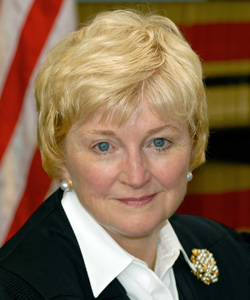
Wisconsin Supreme Court Justice Patience Roggensack
Nov. 13, 2015 – The chief justice of the Wisconsin Supreme Court this week vowed to work with other branches of government to ensure adequate funding of the judicial system and indicated that mandatory e-filing in circuit courts is on its way soon.
Chief Justice Patience Roggensack, elected chief by fellow justices in April, delivered her first-ever State of the Judiciary Address on Wednesday to kick off the Annual Meeting of the Wisconsin Judicial Conference in Madison.
Chief Justice Roggensack said she wants to improve and build partnerships with the legislative and executive branches and will continue to work with them to achieve adequate funding for the courts.
“Adequate funding for the courts is essential to the people whom all three branches of government serve,” she said, noting that every year judges and staff “work tirelessly to shepherd thousands of cases through the judicial system to resolve controversies.”
Roggensack also said that Wisconsin courts must embrace technology to stay efficient and address the changing needs of the public. “To that end, we may begin a new technological journey with mandatory electronic filing of cases, or ‘efiling,’ very soon.”
In 2014, the Wisconsin Committee of Chief Judges filed a petition asking the Wisconsin Supreme Court to mandate that all cases be filed electronically in circuit courts. Some counties allow attorneys to file cases electronically, but e-filing is completely voluntary.
Under the petition, a $5 per case fee would support a mandatory e-filing system. But the petition also relied on $2.1 million in start-up funding in the biennial state budget. No funding was allocated for that purpose, so the court was hesitant to approve the petition.
But Chief Justice Roggensack said that court staff has been working on another method of implementing mandatory e-filing. Roggensack said the court “will likely begin with the requirement to efile a limited number of case types in all circuit courts throughout the state,” and expand mandatory e-filing to other case types over time.
She did not indicate whether the mandatory e-filing fee would be increased to support the system, but the court will likely unveil an approved plan in the coming months.
“Many technologies about which we were once apprehensive, now have become part of our everyday lives – tablets, cell phones and email accounts are proof of that,” the chief justice said in the address. “Over the next several years, we will gain that same level of comfort and reliance with efiling and paperless court files.”
Other Highlights from the Address
Chief Justice Roggensack noted other innovations that are helping courts address the needs of Wisconsin citizens. She noted that Wisconsin judges are getting training in “trauma-based decision-making,” which recognizes that a child’s trauma history impacts their responses to court interactions, and also highlighted problem-solving courts.
For instance, Wisconsin now has 74 treatment courts that “use the heavy hand of prosecution, along with the power to incarcerate, to require non-violent, addicted individuals to engage in treatment and move into active recovery,” she said.
“Nationwide data demonstrates that individuals who go through treatment court programs are significantly less likely to recidivate, and that applies both to those who successfully complete the full treatment court program and to those who do not.”
The Court of Appeals is also busy, Roggensack noted, resolving approximately 2,700 cases per year. She explained that most litigants do not proceed to the Wisconsin Supreme Court, so the appeals court is often the final decisionmaker in those cases.
“As the final review, the Court of Appeals has assisted in developing significant bodies of law in many substantive and procedural areas,” she said.
Chief Justice Roggensack also said that leading up to the next biennial budget cycle, the Wisconsin Supreme Court will be working to “educate the legislature on the need for increased judicial compensation as other states have done.”
State Bar of Wisconsin members and the public can watch the State of the Judiciary Address at WisconsinEye, or read the transcript.
